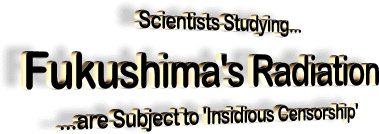|

by L.J. Devon
March 23, 2014
from
NaturalNews Website
Spanish version

In order to appease the fears of the public and maintain order,
leaders of government institutions often restrict valuable and
alarming information from broadcast or publication.
This censorship keeps the masses unaware
but cooperative, as the truth is picked through and decimated.
Such leaders are often timid and tend to
uphold the status quo. They will typically refrain from riling
people up so as not to disturb the powers of special interest that
could shutter their career and livelihood.
While vital information is picked apart and wrought with censorship,
people may suffer from the consequences of not knowing and not being
able to take action.
Scientist
finds alarming initial Fukushima cesium-137 measurements but is
censored
When the Fukushima nuclear crisis began in March 2011, much
censorship was placed on scientists and researchers who set out to
measure the radioactive fallout that was silently affecting the
public.
One scientist, Michio Aoyama, recorded initial findings that
were too startling for the Japanese government. As a senior
scientist working within the Japanese government's Meteorological
Research Institute, Aoyama reported dangerous levels of radioactive
cesium-137 in the surface water of the Pacific Ocean.
His reports estimated that levels of
cesium-137 could be 10,000 times higher than nuclear
contamination measurements from Chernobyl, the world's worst
nuclear accident.
When Aoyama reported these alarming radiation levels in an article
for a publication called Nature, he was met with criticism and
publication restrictions. The director general of the institute
called Aoyama and asked him to remove his name from the paper.
Apparently, he did not want to startle the public with Aoyama's
findings.
When Aoyma asked to have his name
removed, the article was suddenly halted from publication.
Aoyama is not the only one placed under this kind of pressure and
censorship. Various university researchers in Japan report that
their respective universities will not give them funds or support
for the work they conduct involving the Fukushima Daiichi plant.
Professors report off the record in many
cases that they are either obstructed or told to steer clear of data
that might cause public "concern."
The result so far has been three years of downplaying
the Fuskushima disaster, leaving
people unaware of the dangers of high levels of radiation that
adversely affect their health.
Politically
dangerous research
Joji Otaki, a biologist from Japan's Ryukyu University, has
written several papers on how Fukushima radiation triggers inherited
deformities in butterflies, but said,
"Getting involved in this sort of
research is dangerous politically."
Otaki, says the public supports his work
through crowd-funding donations.
American professor obstructed from research, cites "insidious
censorship"
The Japanese government hopes to persuade 155,000 people to return
home as they invest $50 billion in a large decontamination project
that involves scraping away millions of tons of radioactive dirt and
placing it in temporary dumps.
These dumps make a great real-life
research laboratory and are drawing the attention of researchers
from around the world.
Timothy A. Mousseau, a professor of biological sciences at
the University of South Carolina, has tried to conduct three
research projects, but the Japanese government has made his research
difficult.
Upon further investigation, one Japanese professor and two
postdoctoral students involved in Mousseau's research dropped out,
because they could not risk being associated with his findings.
"They felt it was too provocative
and controversial," Moussea said, "and the postdocs were worried
it could hamper their future job prospects."
"It's pretty clear that there is self-censorship or professors
have been warned by their superiors that they must be very, very
careful," he said.
Mousseau referred to the lack of funding at
the national level as some of the "more insidious censorship"
measures.
He added,
"They're putting trillions of yen
into moving dirt around and almost nothing into environmental
assessment."
Japan's
government institutions promotes nuclear power and controls academia
As the Fukushima reality is downplayed, nuclear power continues to
be promoted by the political elite parties in Japan.
Prime Minister Shinzo Abe has
been trying to sell Japan's nuclear technology abroad since he came
to power in 2012. With nuclear power as a priority, dissenters are
silenced and propaganda is pushed through Japan's
government-controlled academia structure.
In fact, government funding for academic
research in Japan mostly funnels through the Japan Society for the
Promotion of Science and the Ministry of Education, Culture, Sports,
Science and Technology.
Academic committees and government
officials are in charge of screening and reviewing the pro-nuclear
energy propaganda.
Mr. Mousseau, eager for solutions, says,
"If we [are] ever going to make any
headway into the environmental impact of these disasters,
statistical power, scientific power, is what counts."
Sources
|

